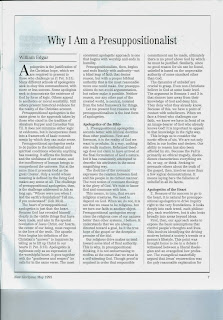
If you haven't gotten a load of the very enriching discussion between Dr. Lane Tipton and Dr. Michael Horton on "union with Christ" over at the Reformed Forum, you can get it here.
Dr. Horton's position, as ably analyzed and recognized by Dr. Tipton, owes much, if not primarily, to a sort of "speech act theory" applied to justification wherein God's illocutionary act of declaring the sinner as justified is the "ontological ground" of the subjective perlocutionary effect in the believer. Contra this position, Dr. Tipton argues that the sole ground of the believer's justification is not a floating fiat but union with Christ. In other words, the application of redemption in a believer's present, time-and-space existence (ordo salutis) is founded upon (or united to) the accomplishment of said redemption by Christ in His life, death, resurrection, and ascension (historia salutis).
Justification was the point of discussion, and so it must be said that as Christ Himself was justified, so the sinner, united to Christ by faith through the Spirit, is also justified through the imputation of the former's righteousness.
We can see, clearly evinced, in the Puritan Thomas Goodwin the same kind of aversion to a notion of "speech act theory" and an exaltation of the person and work of Christ in the following:
We must conceive, that the promises of forgiveness are not as the pardons of a prince, which merely contain an expression of his royal word for pardoning, so as we in seeking of it do rest upon, and have to do only with his word and seal, which we have to show for it; but God’s promises of pardon are made in his Son, and are as if a prince should offer to pardon a traitor upon marriage with his child, whom in and with that pardon he offers in such a relation; so as all that would have pardon, must seek out for his child; and thus it is in the matter of believing. The reason of which is, because Christ is the grand promise, in whom, ‘all the promises are yea and amen’ (2 Cor. 1:20), and therefore he is called the Covenant (Isa. 49:8). So that, as it were folly for any man to think that he has an interest in an heiress’s lands, because he has got the writings of her estate into his hands, whereas the interest in the lands goes with her person, and with the relation of marriage to her, otherwise, without a title to herself, all the writings will be fetched out of his hands again; so is it with all the promises: they hang all upon Christ, and without him there is no interest to be had in them. ‘He that has the Son has life’ (1 John 5:12), because life is by God’s appointment only in him (v. 11). All the promises are as copyhold land, which when you would interest your selves in, you inquire upon what lord it holds, and you take it up of him, as well as get the evidences and deeds for it into your hands; the lord of it will be acknowledged for such in passing his right into your hands. Now this is the tenure of all the promises; they all hold on Christ, in whom they are yea and amen; and you must take them up of him.











































